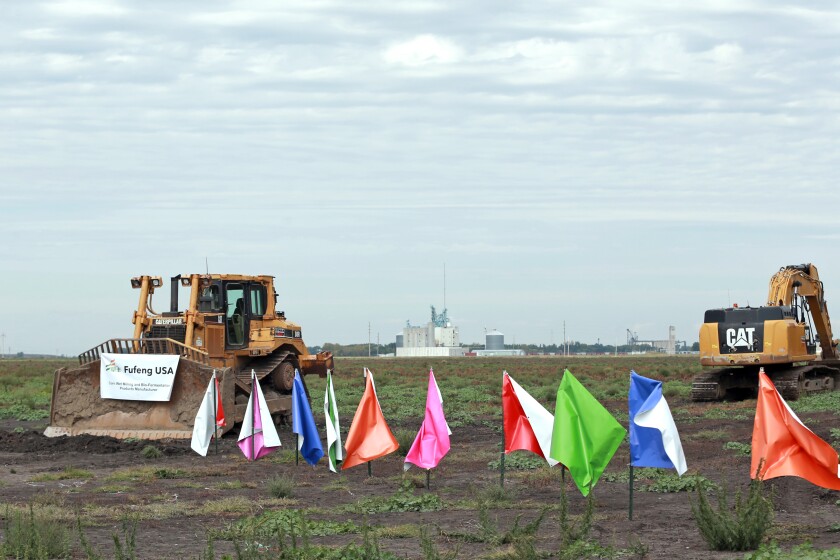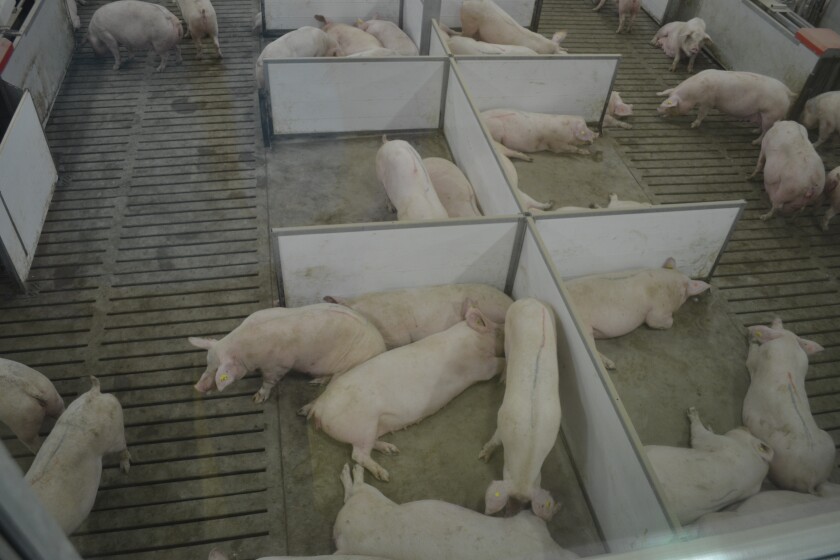As 2023 comes to a close, we look back on some of the big stories of the year in agirculture:
The end of the Fufeng debate
As 2022 came to a close, North Dakota became the center of a debate over foreign ownership of businesses and agricultural land. That debate continued into 2023, leading to legislation in multiple states regarding foreign ownership of ag land, moves in federal legislation to increase oversight of purchases of land by foreign entities, and the eventual dissolution of a deal for a Chinese company to come to North Dakota.
ADVERTISEMENT

in Grand Forks, North Dakota. People in the area were outraged on a number of fronts, including possible national security risks of a company aligned with the Chinese government coming to a community with a U.S. Air Force base, as well as more domestic concerns like the possible annexing of county land into the city, odor problems possible from the plant, and concerns about the company's global track record on labor and environmental issues. The fallout continued throughout 2022 and into 2023.
In a Jan. 27 letter to U.S. Sen. John Hoeven, R-N.D., Andrew P. Hunter, assistant secretary of the Air Force for acquisition, technology and logistics, expressed the Air Force's position that
putting the final nail in the coffin of the project.
But congressional and Another announcement in the community that spanned 2022 and 2023 was that Epitome Energy had shifted its plans for a soybean crush plant from Crookston, Minnesota, to Grand Forks. Epitome Energy CEO Dennis Egan said in November.
The Grand Forks City Council on Dec. 18 approved a development agreement with the company to build the plant on the northern edge of the city.
Carbon pipelines cause controversy
The introduction of ethanol plants to the Midwest brought an added market for producers that has increased stability for farmers. But with it came increased emissions from those ethanol plants. One proposed solution to the emissions — with federal incentives included — was to pipe the emissions underground. The plans of some proposed carbon dioxide pipelines in the Midwest came to a close in 2023.
- in October: would have included the ethanol plants owned by South Dakota-based POET, the world's largest biofuels producer. The group planned to send liquid carbon dioxide to Illinois.
- In November, Wolf Carbon Solutions ended their carbon pipeline application in Illinois: to connect two ethanol plants in Iowa to underground storage in Illinois.
- Iowa-based Summit Carbon Solutions had its pipeline permit applications and It has proposed building a pipeline across five states to transport liquid carbon dioxide emissions from about 30 ethanol plants to an underground sequestration site in North Dakota. Summit continues its work to move forward with the project and announced in December that they have reached a milestone of acquiring 80% of the right of way needed for its proposed carbon capture, transport, and storage project across North Dakota.

Early 2023 was filled with hearings over new ordinances trying to limit where the pipelines could be installed and discussions about the necessity of these pipelines to the renewable fuels industry. In one story, an expert indicated that the driver behind these pipelines was California state policy aimed at low-carbon fuels. Another renewable fuels leader said plants have other options to lower their carbon emissions footprint, but that this is one option.
ADVERTISEMENT
Final public hearings on the CO2 pipelines took place in the summer. Meetings at the end of 2023 continued to draw crowds of landowners fighting the prospects of eminent domain taking away their desire to not have the pipeline on their property and as property owners seek to keep the pipeline groups off their land.
As Summit continues work to construct the pipeline network, the company maintains that the work is an investment in the future of agriculture and will enhance the long-term economic viability of the ethanol and agriculture industries.
Supreme Court decision on Prop 12
The handed down a split decision that upheld California's so-called Proposition 12, a voter-enacted law that considers confinement of pigs "cruel" if it prevents a pig from "lying down, standing up, fully extending (its) limbs or turning around freely." If they want their pork sold in California, pork producers nationwide have to comply.

While the law was implemented on July 1, the industry response to it has not stopped.
American Crystal Sugar shuts down Sidney plant
American Crystal Sugar Co. in February announced The announcement was a blow to growers on the Montana-North Dakota border, as well as the community of Sidney, as the plant employed about 300 people. The company cited declining acreage in the Sidney area as the reason for the closure. The Montana-Dakota Beet Growers Association Board said poor contracts from American Crystal had led to the decreased acreage.
American Crystal went on to have arguably its best year ever in 2023, setting records for per-acre yield, overall tonnage and expected price per ton.
Supreme Court decision on WOTUS
The issued a long-awaited opinion in the case Sackett v. Environmental Protection Agency, which addressed concerns about the U.S. Environmental Protection Agency's Waters of the U.S. rule. Water policy has long been a hot topic in agriculture as it continues to go through a tug-of-war between various presidential administrations.
ADVERTISEMENT
The Sackett ruling limited the federal government's authority on waterways and drainage but didn't entirely clear up the issue of what's allowed in federal water policy.
.
There remain active lawsuits over WOTUS, and much uncertainty still exists.
Land use rights questioned in White Earth Nation
In October, Agweek reported on Farmer David Vipond and a group of irrigating neighbors were at the start of a protracted battle over whether White Earth Nation can legally require their own tribal water permits on private lands within the reservation in northwestern Minnesota and even areas outside the reservation.
in addition to the Minnesota Department of Natural Resources permit he obtained. Vipond believes the White Earth permit is unnecessary.
The state of Minnesota hasn’t ceded its authority, but farmers expect their next several years will be fraught with court time, expense and aggravation.










